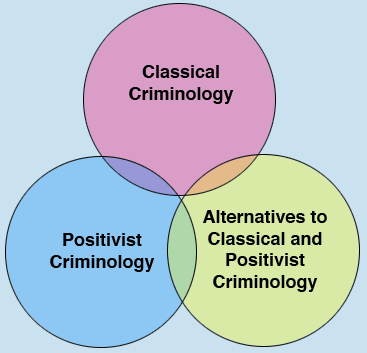Major Theoretical Schools of Thought
 Since sociologists and criminological theorists (sometimes the same person!) began to write about crime causation (1700s forward) they have attempted to separate out theories into meaningful categories (or paradigms, schools of thought, etc.). Although open to debate (and sociologists love to debate!), there are three major such schools of thought. The first is Classical Criminology and finds its roots in Cesare Beccaria's On Crimes and Punishment (1764). This school attributes crime to individual free will, and argues that people engage in weighing the costs and the benefits associated with the criminal event (hedonistic calculus) before determining whether such behavior is worth the likely gain (or pleasure vs. pain principle). From this perspective, the only way to avoid crime is to make it painful. In other words, only a strict crime control model will deter crime.
Since sociologists and criminological theorists (sometimes the same person!) began to write about crime causation (1700s forward) they have attempted to separate out theories into meaningful categories (or paradigms, schools of thought, etc.). Although open to debate (and sociologists love to debate!), there are three major such schools of thought. The first is Classical Criminology and finds its roots in Cesare Beccaria's On Crimes and Punishment (1764). This school attributes crime to individual free will, and argues that people engage in weighing the costs and the benefits associated with the criminal event (hedonistic calculus) before determining whether such behavior is worth the likely gain (or pleasure vs. pain principle). From this perspective, the only way to avoid crime is to make it painful. In other words, only a strict crime control model will deter crime.
The second school of thought, Positivist Criminology, disagrees with the Classical perspective and argues that crime is caused by many things. Behavior is determined by multiple causes and the only way to do something about crime is to understand and do something about its root causes. This perspective calls for rehabilitation, or efforts to discover why people behave the way they do and get them the appropriate treatment they need in order to live crime free.
The third school of thought goes by many names and can sometimes seem confusing to the lay person. We will refer to this third perspective as Alternatives to Classical and Positivist Criminology. This perspective is often called radical as it questions the legal order and the way in which society reacts to law-breaking behavior. Questions asked by radical criminologists might include: Who gets to say what is deviant or unlawful behavior? Is the criminal justice system just an arm of the ruling class? Is the criminal justice system fair and equitable in its dealings with all people? Could it be possible that what we do to people once they do break the law makes them worse off than if we had just left them alone?
Of course, we will find some overlap across these major paradigms, but understanding why a theory falls under one of these schools of thought will prove useful to the student of criminological theory.
